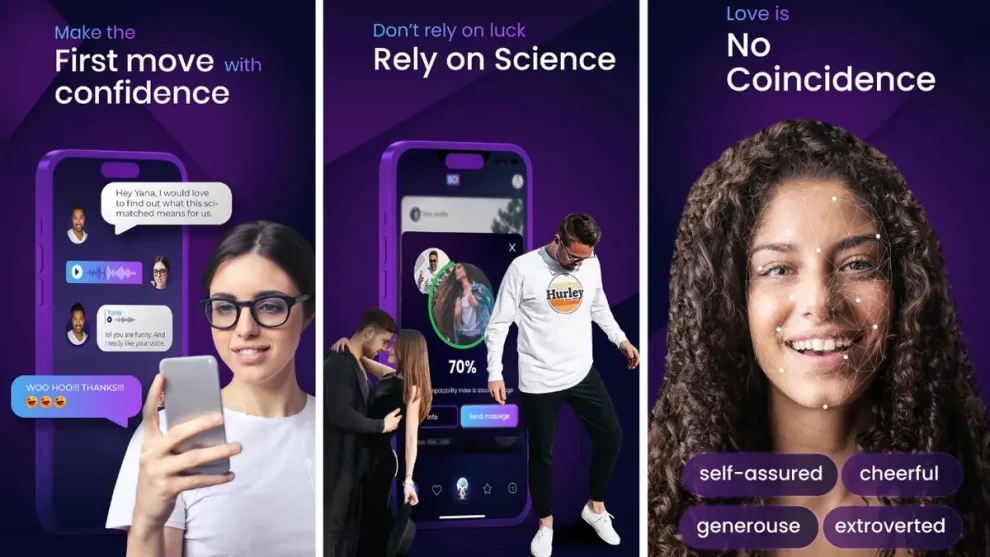The world of online dating has come a long way from the pixelated profiles of the early internet. Today, sophisticated AI algorithms are taking the reins, promising to guide us towards our perfect match. But can lines of code truly decipher the complexities of human connection? Let’s explore the fascinating world of AI matchmaking in online dating apps.
The Rise of the Algorithmic Cupid
Gone are the days of endless swiping through an ocean of faces. AI-powered algorithms are now analyzing our behavior, preferences, and even personality traits to curate personalized dating pools. These algorithms pore over our swiping patterns, “like” clicks, and even conversation data, building multi-dimensional profiles that go beyond superficial appearances. By identifying patterns and similarities, they aim to connect us with individuals who share our values, interests, and even sense of humor.
The Science of Compatibility

But what exactly constitutes compatibility? AI matchmaking algorithms often rely on a cocktail of factors. Some focus on demographic similarities like age, education, and location. Others delve deeper, analyzing personality quizzes and answers to open-ended questions to gauge compatibility on a more nuanced level. Some algorithms even incorporate psychometric analysis, drawing insights from users’ social media activity or gaming habits.
Personality Matching
Personality matching algorithms use machine learning models to map out users’ personality traits and emotional needs from their responses and activity patterns. Apps like Hinge and eHarmony rely heavily on personality testing to determine matches. For example, questioning whether you’re more introverted or extroverted helps assess compatibility with potential partners.
Values Alignment
Going beyond superficial traits, some apps use value alignment algorithms. These examine users’ worldviews, aspirations, interests and quirks through testing. Finding shared values across fundamental questions like wanting kids or prioritizing career allows values matching algorithms to score potential relationship success.
Behavior Analysis
Behavior analysis algorithms draw inferences about users from their micro-behaviors on the platform. Liking specific profiles, messaging frequency, response rate and even text analysis provide valuable behavioral clues. These feed into similarity scoring algorithms to quantify compatibility.
Beyond the Algorithm: The Human Touch
While AI plays a significant role, it’s important to remember that love is not merely a mathematical equation. Critics argue that relying solely on algorithms can overlook the spark of serendipity and the intangible chemistry that often blossoms in unexpected connections. Additionally, concerns about bias and discrimination exist, with algorithms potentially perpetuating existing societal inequalities in the dating pool.
The Serendipity Factor
Some apps intentionally build in an element of randomness in their recommendations. Serendipity algorithms serve up wild card matches that break the algorithmic bubble to allow for surprise connections. Diversifying matches prevents getting trapped in a compatibility echo chamber.
Ethical AI in Dating
As machine learning enters the intimate sphere of relationships, developers face an ethical responsibility. Biased data that informs algorithms or lack of transparency around matchmaking protocols undermine user trust. Companies like Hinge publish internally audited reports on avoiding unfair biases through ethical AI frameworks.
The Future of AI Matchmaking
Despite these challenges, the future of AI matchmaking looks promising. As algorithms become more sophisticated and incorporate diverse data points, they can potentially offer more personalized and accurate recommendations. Imagine AI-powered virtual assistants that coach you on your dating profile, suggest conversation topics, or even analyze your dates’ responses to provide real-time feedback.
Hyper Personalized Recommendations
Advancements in deep learning algorithms open possibilities for hyper personalized recommendations tuned to users’ granular preferences across multitudes of attributes. Apps are beginning to integrate imagen recognition AI to analyze profile photos and videos for additional matching signals.
Conversational Bots
Chatbot algorithms that can carry on personalized conversations are entering the online dating sphere. These provide coaching to improve flirting and first date skills for socially awkward daters. Going forward, conversational AI aims to fluidly communicate with users to surface better dating prospects.
Empowering Human Choice
However, the ultimate goal should not be to replace human interaction with algorithms. Instead, AI should serve as a helpful guide, filtering out irrelevant matches and presenting us with a pool of potential connections we might not have otherwise discovered. Ultimately, the decision to swipe right or left, to spark conversation or walk away, should remain firmly in our own hands.
















Add Comment